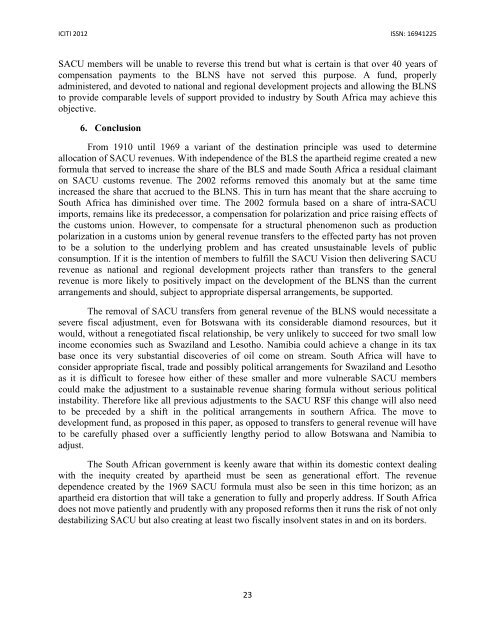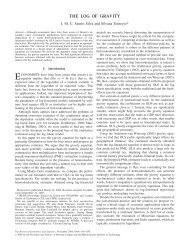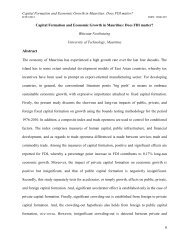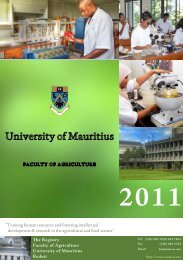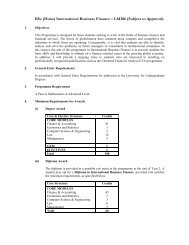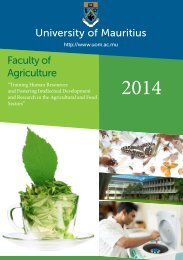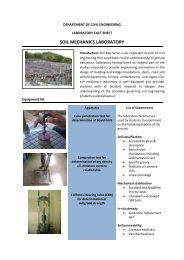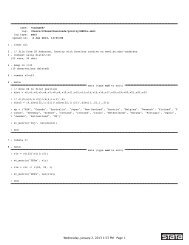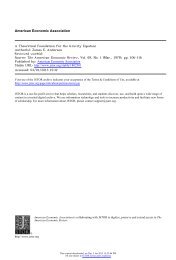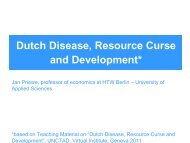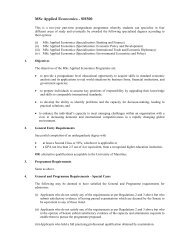SACU Revenue Sharing Formula - the University of Mauritius
SACU Revenue Sharing Formula - the University of Mauritius
SACU Revenue Sharing Formula - the University of Mauritius
Create successful ePaper yourself
Turn your PDF publications into a flip-book with our unique Google optimized e-Paper software.
ICITI 2012 ISSN: 16941225<strong>SACU</strong> members will be unable to reverse this trend but what is certain is that over 40 years <strong>of</strong>compensation payments to <strong>the</strong> BLNS have not served this purpose. A fund, properlyadministered, and devoted to national and regional development projects and allowing <strong>the</strong> BLNSto provide comparable levels <strong>of</strong> support provided to industry by South Africa may achieve thisobjective.6. ConclusionFrom 1910 until 1969 a variant <strong>of</strong> <strong>the</strong> destination principle was used to determineallocation <strong>of</strong> <strong>SACU</strong> revenues. With independence <strong>of</strong> <strong>the</strong> BLS <strong>the</strong> apar<strong>the</strong>id regime created a newformula that served to increase <strong>the</strong> share <strong>of</strong> <strong>the</strong> BLS and made South Africa a residual claimanton <strong>SACU</strong> customs revenue. The 2002 reforms removed this anomaly but at <strong>the</strong> same timeincreased <strong>the</strong> share that accrued to <strong>the</strong> BLNS. This in turn has meant that <strong>the</strong> share accruing toSouth Africa has diminished over time. The 2002 formula based on a share <strong>of</strong> intra-<strong>SACU</strong>imports, remains like its predecessor, a compensation for polarization and price raising effects <strong>of</strong><strong>the</strong> customs union. However, to compensate for a structural phenomenon such as productionpolarization in a customs union by general revenue transfers to <strong>the</strong> effected party has not provento be a solution to <strong>the</strong> underlying problem and has created unsustainable levels <strong>of</strong> publicconsumption. If it is <strong>the</strong> intention <strong>of</strong> members to fulfill <strong>the</strong> <strong>SACU</strong> Vision <strong>the</strong>n delivering <strong>SACU</strong>revenue as national and regional development projects ra<strong>the</strong>r than transfers to <strong>the</strong> generalrevenue is more likely to positively impact on <strong>the</strong> development <strong>of</strong> <strong>the</strong> BLNS than <strong>the</strong> currentarrangements and should, subject to appropriate dispersal arrangements, be supported.The removal <strong>of</strong> <strong>SACU</strong> transfers from general revenue <strong>of</strong> <strong>the</strong> BLNS would necessitate asevere fiscal adjustment, even for Botswana with its considerable diamond resources, but itwould, without a renegotiated fiscal relationship, be very unlikely to succeed for two small lowincome economies such as Swaziland and Lesotho. Namibia could achieve a change in its taxbase once its very substantial discoveries <strong>of</strong> oil come on stream. South Africa will have toconsider appropriate fiscal, trade and possibly political arrangements for Swaziland and Lesothoas it is difficult to foresee how ei<strong>the</strong>r <strong>of</strong> <strong>the</strong>se smaller and more vulnerable <strong>SACU</strong> memberscould make <strong>the</strong> adjustment to a sustainable revenue sharing formula without serious politicalinstability. Therefore like all previous adjustments to <strong>the</strong> <strong>SACU</strong> RSF this change will also needto be preceded by a shift in <strong>the</strong> political arrangements in sou<strong>the</strong>rn Africa. The move todevelopment fund, as proposed in this paper, as opposed to transfers to general revenue will haveto be carefully phased over a sufficiently lengthy period to allow Botswana and Namibia toadjust.The South African government is keenly aware that within its domestic context dealingwith <strong>the</strong> inequity created by apar<strong>the</strong>id must be seen as generational effort. The revenuedependence created by <strong>the</strong> 1969 <strong>SACU</strong> formula must also be seen in this time horizon; as anapar<strong>the</strong>id era distortion that will take a generation to fully and properly address. If South Africadoes not move patiently and prudently with any proposed reforms <strong>the</strong>n it runs <strong>the</strong> risk <strong>of</strong> not onlydestabilizing <strong>SACU</strong> but also creating at least two fiscally insolvent states in and on its borders.23


